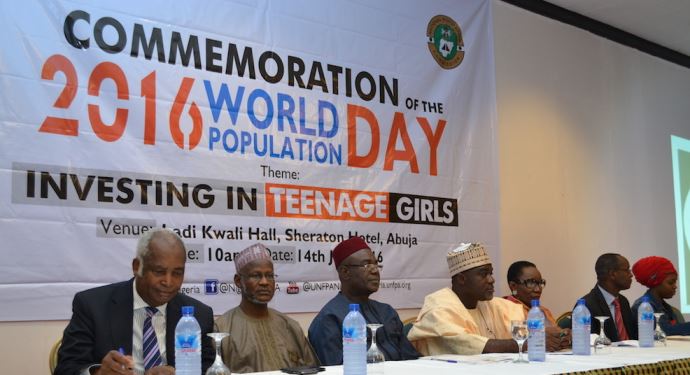At a World Population Day Commemoration event in Abuja on 14th July, 2016, Professor Oladapo Ladipo, representing Nigerian NGOs (NNGOs), advocated that Nigeria bans early marriage for underage girls.
The panel discussion event was organized by the National Population Commission (NPC) and the United Nations Population Fund (UNFPA), and focused on the 2016 World Population Day theme: “Investing in Teenage Girls”.
Professor Ladipo, President/CEO of the Association for Reproductive and Family Health (ARFH), while presenting a goodwill message on behalf of NGOs, stated that the NGO community want to pledge unwavering support to the Government of Nigeria to develop responsive policies that will enhance girl-child education, their protection and ban of teenage and early marriage for underage girls, like Gambia did recently. He reiterated that enhancing girl child education is in line with the vision of the new United Nations Sustainable Development Goal on education that all girls and boys complete free, equitable and quality primary and secondary education by 2030.
Professor Ladipo also advocated for free primary and secondary education for boys and girls with increased focus on support for the girl child as Nigeria must recognise the opportunity cost that for many poor families, the cost of sending a girl to school seems like an extra burden.
He said that “we will continue to advocate that our government put in favourable policies that will encourage young girls to enroll in schools and remain in schools; as we all know, education can have a powerful impact in reducing child and early marriage.”
He appealed that all stakeholders must support Girl–Child education planning, access to qualitative health care, access to Sexual and Reproductive Health information and services, access to qualitative education on Life Building skills that will help teenage girls. “The most marginalized also should get the quality education and empowerment they need and deserve to attain their full potentials.”
Along with the secretary to the government of the federation and members of the House of Representatives of Nigeria and other policy makers, teenage girls from diverse backgrounds were invited to the event to ensure that experiences and views expressed are representative of their conditions.
The NPC Chairman, Barrister Eze Duruiheoma, in his remarks stated that to focus on critical issues affecting the welfare of teenage girls and proffer solutions, teenage girls were invited to share their experiences, ideas and expectations for the future. The girls’ participation in an intergenerational dialogue with policy makers from relevant executive and legislative arms of government is to solicit appropriate interventions that can guarantee sustainable investment in teenage girls.
Barrister Duruiheoma stated that: “The society believes it knows the problem of the teenagers better and this approach runs against the conventional wisdom that he who wears the shoes knows where they pinch. No meaningful and sustainable programmes for the improvement of the lives of the teenage girls can be achieved without their inputs and active participation”.
He also said that: “As we commemorate the 2016 World Population Day, we must constantly remind ourselves that the welfare of the present and future generations of Nigerians depend on decisions we make today and there cannot be better or smarter decisions than to invest in the education, health and general well-being of this critical mass of our population. We must bear in mind that investment in the teenage girls is the safest investment any nation can make”.
Many teenage girls and young women were present at the event, some carrying small placards with inscribed messages demanding for education, gender equality, implementation of the child rights act and other rights of the girl child. The girls that participated in the panel discussion shared sad experiences of early marriage, forced marriage by their families, child bearing, oppression by their spouses and the challenges faced in seeking education, pleading for support in their quest for empowerment.


